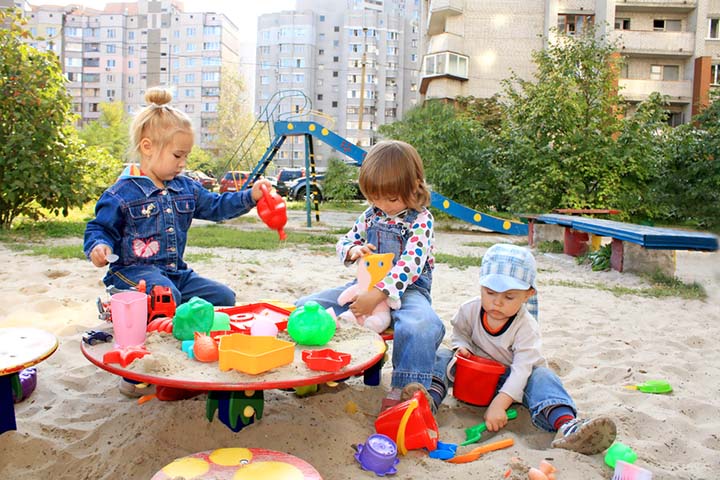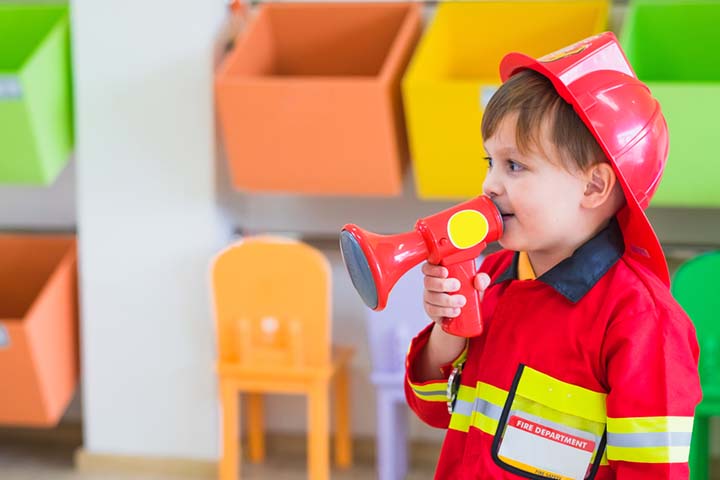
Image: Shutterstock
As a parent, you may be ready to do anything it takes to ensure that your child grows up to be a happy and successful individual. You’ve probably thought about the best school to enroll them into, the best neighborhood to move to, thought of some extracurricular activities and classes they can take for overall development and mapped out a schedule to accommodate it all. But did you know that the answer to this is as simple as playing with them? That’s right, contrary to popular belief, your kids don’t need you to spend hundreds of thousands of dollars on them. They just need you to be present and play with them in order to learn important life lessons and skills. In this article we will discuss ways in which you can teach your children essential life lessons through their favorite medium: play. Read on to know more!
1. Play With Sand And Water
Image: Shutterstock
This may seem like nothing but a great big mess to you. But did you know that playing with sand and water can be essential for introducing your kids to the world of science and math? They can learn about different materials like solids and liquids and grasp what they mean in simple terms. They can start to grasp measurements with cups and other toys, and they can develop their fine motor skills, which are crucial for their development. So the next time they jump into the sand box with a bucket full of water, join in on the fun! Everything is a learning experience after all.
2. Use Role Playing Tools To Avoid Behavioral Problems
Image: Shutterstock
Toys that encourage children to engage in role-playing activities can significantly boost their imagination and help them develop essential skills for interacting with the real world. This is a valuable advantage for parents. Recent research has revealed an exciting finding: engaging in pretend play with role-playing toys can reduce the likelihood of children experiencing behavioral problems in the future (1). How amazing is that! Mothers who actively participated in these imaginative games reported having an easier time teaching their children appropriate behaviors in various situations, while those who didn’t engage in such play found it more challenging to manage their children’s behavior. So, all those times spent playing games like doctor, house, or cooking weren’t in vain – they’ve been instrumental in helping your children grasp proper conduct in different scenarios and environments.
3. Play Dress Up
Image: Shutterstock
Be honest, didn’t you miss dressing up as an astronaut or a dragon? Now you can do it all over again, with your kids. Playing dress up or as different characters is often known as pretend play and there are several benefits to allowing your children to engage in this form of play. For example, did you know that parents who let their children indulge in pretend play might notice that it helps to boost cognitive skills, social skills and even language skills (2)? That’s right, all that just because you pretended to be a pirate or a fairy for half an hour with your little one. Besides, it’s best to get more hardcore costumes involved as your child grows older.
However, during their early preschool years, children transition to more intricate imaginative play, which may not require any physical props at all. They might engage in pretend play using invisible objects. The most sophisticated form of this play involves interactions with other children and can extend over days or even weeks. Naturally, caregivers and parents can participate in pretend play with their children, regardless of their age.
4. Play Ball Games
Image: Shutterstock
Playing ball and other sports are important in order to aid in the development of your child’s coordination. But they also contribute to the development of fine and gross motor skills, strength, flexibility and stamina. All are essential skills your child needs to be in complete possession of. Not to mention that when they play ball games with other kids, they learn how to share. Important values like teamwork and sportsmanship are also accumulated during this time.
5. Play With Musical Toys
Image: Shutterstock
Your 5 year old may be too tiny for the guitar but there’s no need to ban them from sample musical toys. In fact, you must be encouraging it! Musical toys are great for teaching kids about rhythm, hearing, listening, and more. Regardless of whether your child chooses to listen to music or plays music on a musical toy, they will develop essential skills that will help them later in life.
Trying to squeeze in some life lessons and essential skills while you have a fun time playing with the kids isn’t impossible. After all, no learning happens in a vacuum so engage in play as much as they’d like and learn along the way!

















